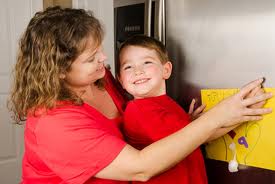Providing praise and encouragement is one of the most important everyday interactions parents can have with their children to improve behavior. As simple as this may seem, sometimes it is easier to focus on the negative and the behavior we dislike. But research shows that the behavior we pay more attention to will be the behavior that is likely to be repeated. A simple smile, encouraging phrase, or hug goes a long way in decreasing negative behaviors and improving a child’s emotional wellbeing and self-esteem. According to Carolyn Webster-Stratton, founder of the Incredible Years Series for parents, teachers, and children*, praise and encouragement can give children the motivation they need to complete difficult tasks, develop a positive self-image, and guide children through the many small steps it takes to master new skills.
Three effective praise and encouragement how-to’s
1. Use labeled praise: Being specific in your praise is important for children to understand what behavior you like. For example: if a child is playing and sharing nicely with a peer but we simply say “good job,” it may not be understood what the “good job” was for. Instead, try “good job sharing with your friend” or “I like how nicely you are sitting and playing with your friend.”
Other examples of labeled praise:
• I like how you put your shoes by the front door.
• You are such a big girl for getting into bed right away.
• What a nice job of getting dressed for school.
• Wow, you are picking up all your toys like you were asked.
• You are so proud of how you built that tower all by yourself.
2. Deliver praise with excitement: Coupling our words with our expressions is important. The majority of our communication is through nonverbal behavior, so say your praise with excitement and a smile. This is especially important for children who may be inattentive. Praise provided in a low, monotone voice may not be heard or understood as easily as praise with excitement.
3. Be timely and consistent: Praising behavior immediately is crucial. This is particularly true for younger children in order to ensure the positive reinforcing behavior is there. If a child begins picking up his toys, rather than waiting until it is complete, praise immediately while the behavior is still happening. This gives more motivation and clear expectations of what you like and want. It is also important to be consistent, e.g., praise the behavior every time it happens. You can begin to praise less often once the desired behavior is more frequent.
*Michelle Walker and Martha FitzSimon will be leading a pre-school group based on the Incredible Years Series at Crossroads Family Counseling Center. For more information, please contact Michelle directly at 703-341-7839, michelle@crossroadsfamilycc.com.
